文章目录
描述
1.list是可以在常数范围内在任意位置进行插入和删除的序列式容器,并且该容器可以前后双向迭代。
2.list的底层是双向链表结构,双向链表中每个元素存储在互不相关的独立节点中,在节点中通过指针指向其前一个元素和后一个元素。
3.list与forward_list非常相似:主要不同在于forward_list是单链表,只能单方向迭代。
4.与其他的序列式容器相比(array,vector,deque),list在任意位置进行插入、移除元素的执行效率更好。
5.与其他序列式容器相比,list和forward_list最大的缺陷是不支持任意位置的随机访问,比如:要访问list的第6个元素,必须从已知的位置(比如头部或者尾部)迭代到该位置。
6.list还需要一些额外的空间,以保存每个节点的相关联信息。
一、list(STL库)
常见接口

list使用
链表头插、链表尾插
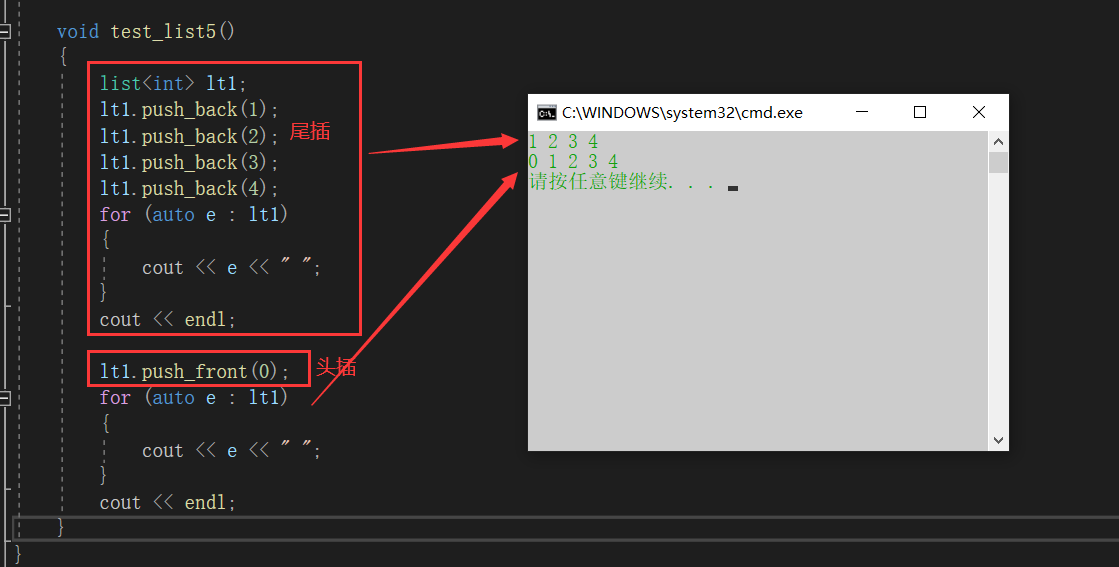
链表头删、链表尾删

链表遍历
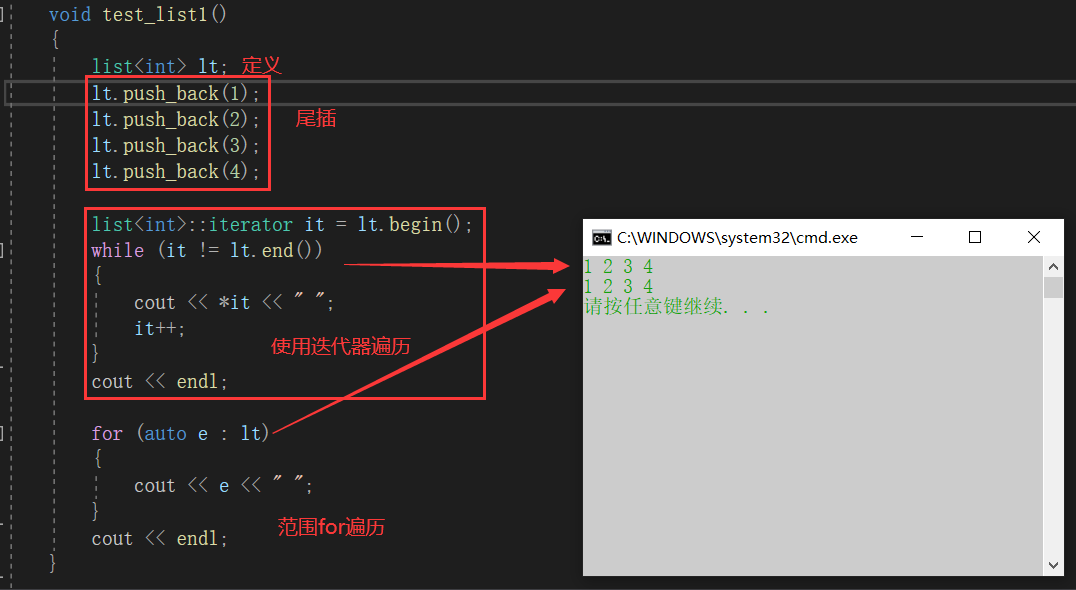
链表指定位置的插入和删除
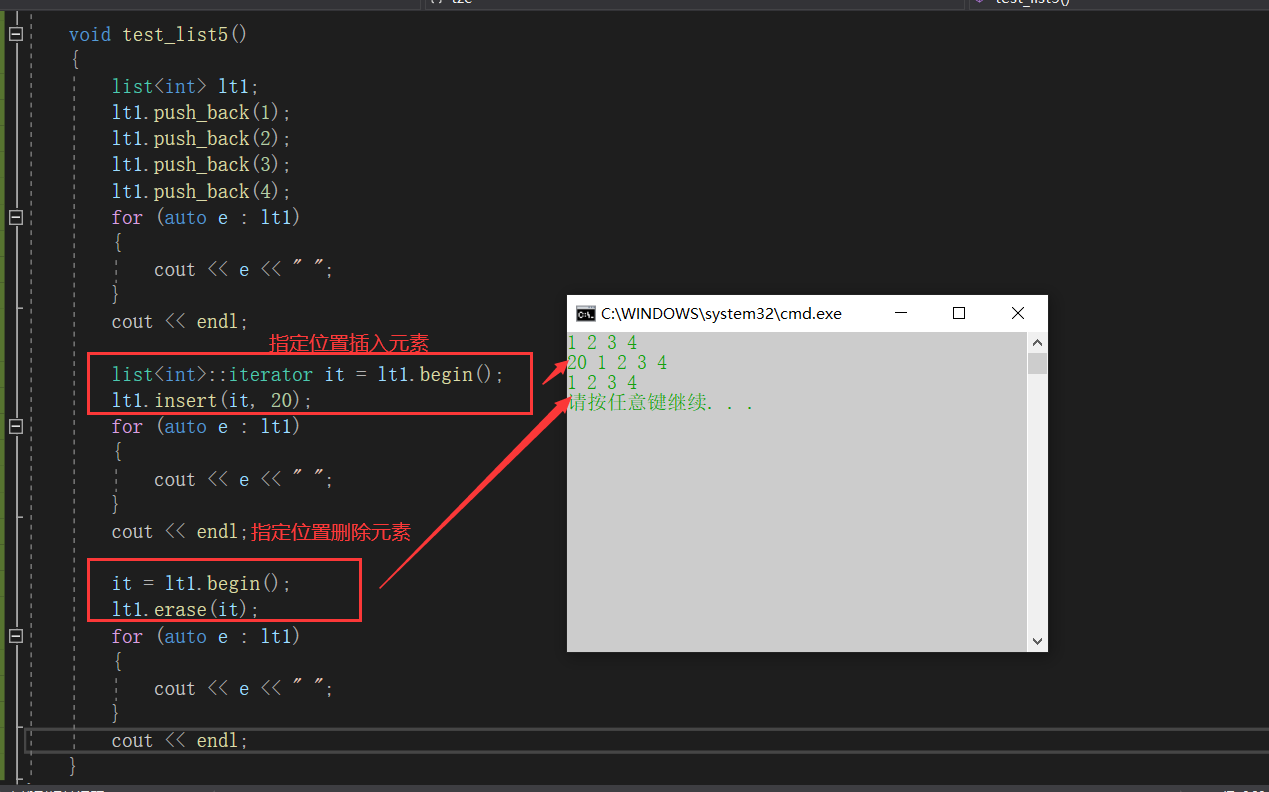
clear清除
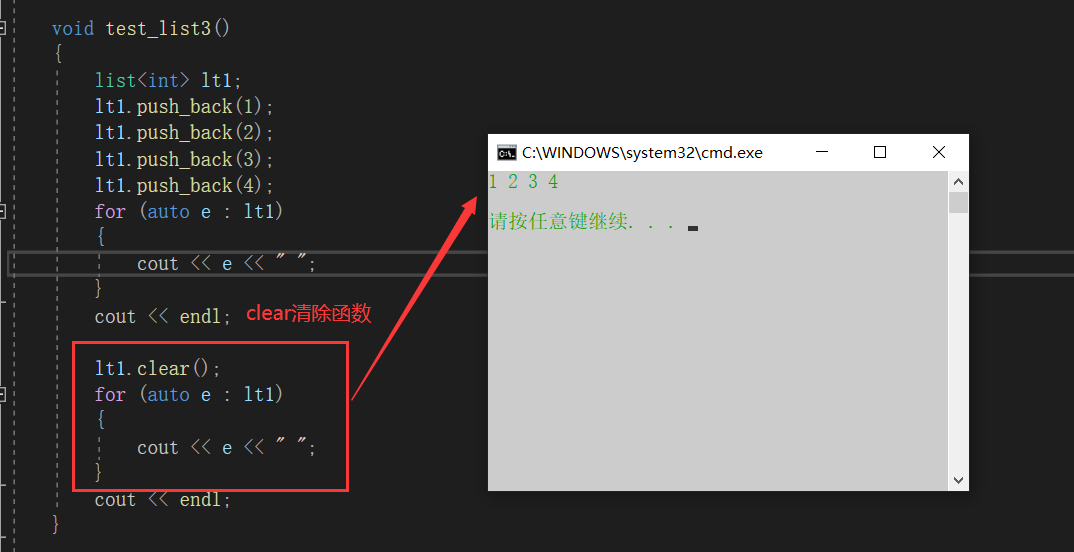
构造函数
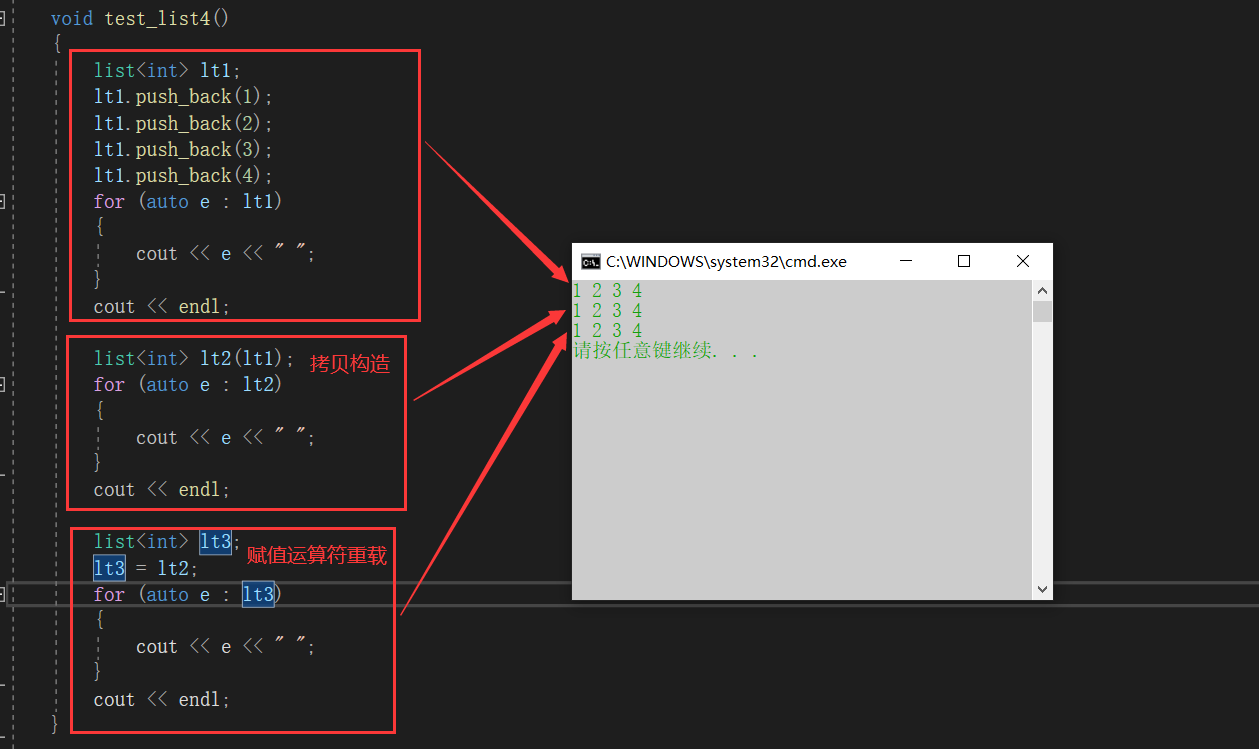
二、list 模拟实现
1.节点
template<class T>
struct list_node
{
list_node<T>* _next;
list_node<T>* _prev;
T _data;
list_node(const T& x=T())
:_next(nullptr)
,_prev(nullptr)
,_data(x)
{
}
};
2.构造函数,析构函数,赋值运算符重载,clear函数
void empty_init()
{
_head = new node;
_head->_next = _head;
_head->_prev = _head;
}
//构造函数
list()
{
//初始化内部成员
empty_init();
}
//迭代器构造函数
template<class Iterator>
list(Iterator first, Iterator last)
{
empty_init();
while (first != last)
{
push_back(*first);
++first;
}
}
void swap(list<T>& tmp)
{
//std标准库中的swap函数
std::swap(_head, tmp._head);
}
//拷贝构造
list(const list<T>& lt)
{
empty_init();
list<T> tmp(lt.begin(), lt.end());
swap(tmp);
}
//不能使用引用,会使原始数据发生改变 现代写法,传参数不使用引用,进行拷贝构造,然后交换
list<T>& operator=(list<T> lt)
{
swap(lt);
return *this;
}
//析构函数
~list()
{
clear();
delete _head;
_head = nullptr;
}
//清除函数,用来清除链表数据,保留头结点
void clear()
{
iterator it = begin();
while (it != end())
{
it = erase(it);
}
}
3.迭代器(iterator)
list的迭代器与vector和string不同,list的迭代器不是原生指针,而是对链表结点指针的封装,实现与vector和string功能相同的迭代器,list迭代器本质上是链表结点的指针,链表结点的指针不能进行++操作,因为链表结构的特殊,存储的地址不连续,我们使用封装和运算符重载实现了可以对迭代器进行的各种++操作,以及比较,解引用等操作。
//迭代器的三个类模板参数,第一个是迭代器指向内容的数据类型,
//第二个参数是为了可以同时实现普通迭代器和const迭代器,使用模板参数,减少写冗余代码
//第三个参数是重载->操作符,为了方便迭代器指向的元素类型是自定义类型,可以使用迭代器访问其成员变量
template<class T, class Ref,class ptr >
struct _list_iterator
{
typedef list_node<T> node; //结点
typedef _list_iterator<T,Ref,ptr> self;
node* _node;
_list_iterator(node* n)
:_node(n)
{
}
//不需要写拷贝构造,因为不需要去析构
Ref operator*()
{
return _node->_data;
}
ptr operator->()
{
//重载的->返回的是指针类型,在使用的时候访问成员变量得使用两个->,编译器进行优化为一个->
return _node->_data;
}
self& operator++()
{
_node = _node->_next;
return *this;
}
self operator++(int)
{
self ret(*this);
_node = _node->_next;
return ret;
}
self& operator--()
{
_node = _node->_prev;
return *this;
}
self operator--(int)
{
self ret(*this);
_node = _node->_prev;
return ret;
}
bool operator!=(const self& s)
{
//判断指针
return _node != s._node;
}
bool operator==(const self& s)
{
//判断指针
return _node == s._node;
}
};
3.begin(),end()
begin()返回一个指向收个元素的迭代器
end()返回的迭代器指向最后一个元素的后一个位置,最后一个元素的后一个位置为头结点,所以end()返回指向头结点的迭代器
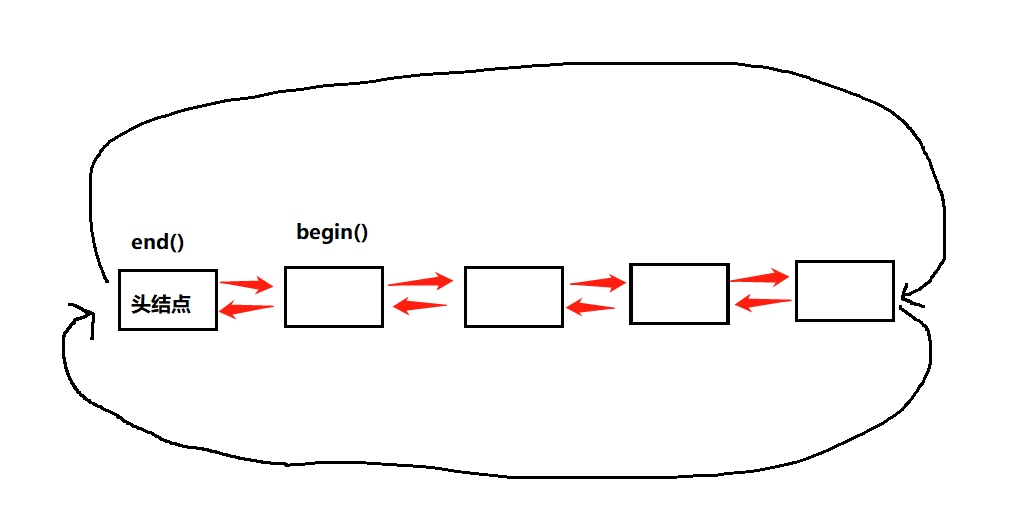
typedef _list_iterator<T,T&,T*> iterator;
typedef _list_iterator<T,const T&,const T*> const_iterator;
//这里使用typedef更方便使用实现的迭代器,
iterator begin()
{
return iterator(_head->_next);
}
iterator end()
{
return iterator(_head);
}
const_iterator begin()const
{
return const_iterator(_head->_next);
}
const_iterator end()const
{
return const_iterator(_head);
}
4.头插、尾插、指定位置插入
void push_back(const T& x)
{
//可以复用insert
//insert(end(), x);
node* tail = _head->_prev;
node* new_node = new node(x);
tail->_next = new_node;
new_node->_prev = tail;
new_node->_next = _head;
_head->_prev = new_node;
}
//头插
void push_front(const T& x)
{
//复用insert 头插即为begin()位置插入元素
insert(begin(), x);
}
//指定位置插入
void insert(iterator pos,const T& x)
{
node* cur = pos._node;
node* prev = cur->_prev;
node* new_node = new node(x);
prev->_next = new_node;
new_node->_prev = prev;
new_node->_next = cur;
cur->_prev = new_node;
}
5.头删、尾删、指定位置删
//pos位置删除元素
iterator erase(iterator pos)
{
assert(pos != end());
node* prev = pos._node->_prev;
node* next = pos._node->_next;
prev->_next = next;
next->_prev = prev;
delete pos._node;
return iterator(next);
}
//尾删 复用erase
void pop_back()
{
erase(--end());
}
//头删 复用erase
void pop_front()
{
erase(begin());
}
三、模拟实现源码
#define _CRT_SECURE_NO_WARNINGS 1
#include<iostream>
#include<assert.h>
#include<algorithm>
namespace tzc {
template<class T>
struct list_node
{
list_node<T>* _next;
list_node<T>* _prev;
T _data;
list_node(const T& x=T())
:_next(nullptr)
,_prev(nullptr)
,_data(x)
{
}
};
template<class T, class Ref,class ptr >
struct _list_iterator
{
typedef list_node<T> node;
typedef _list_iterator<T,Ref,ptr> self;
node* _node;
_list_iterator(node* n)
:_node(n)
{
}
//不需要写拷贝构造,因为不需要去析构
Ref operator*()
{
return _node->_data;
}
ptr operator->()
{
return _node->_data;
}
self& operator++()
{
_node = _node->_next;
return *this;
}
self operator++(int)
{
self ret(*this);
_node = _node->_next;
return ret;
}
self& operator--()
{
_node = _node->_prev;
return *this;
}
self operator--(int)
{
self ret(*this);
_node = _node->_prev;
return ret;
}
bool operator!=(const self& s)
{
//判断指针
return _node != s._node;
}
bool operator==(const self& s)
{
//判断指针
return _node == s._node;
}
};
template<class T>
class list
{
typedef list_node<T> node;
public:
typedef _list_iterator<T,T&,T*> iterator;
typedef _list_iterator<T,const T&,const T*> const_iterator;
iterator begin()
{
return iterator(_head->_next);
}
iterator end()
{
return iterator(_head);
}
const_iterator begin()const
{
return const_iterator(_head->_next);
}
const_iterator end()const
{
return const_iterator(_head);
}
void empty_init()
{
_head = new node;
_head->_next = _head;
_head->_prev = _head;
}
list()
{
empty_init();
}
template<class Iterator>
list(Iterator first, Iterator last)
{
empty_init();
while (first != last)
{
push_back(*first);
++first;
}
}
//拷贝构造
//list(const list<T>& lt)
//{
// empty_init();
// for (auto e : lt)
// {
// push_back(e);
// }
//}
void swap(list<T>& tmp)
{
//std标准库中的swap函数
std::swap(_head, tmp._head);
}
list(const list<T>& lt)
{
empty_init();
list<T> tmp(lt.begin(), lt.end());
swap(tmp);
}
//不能使用引用,会使原始数据发生改变
list<T>& operator=(list<T> lt)
{
swap(lt);
return *this;
}
~list()
{
clear();
delete _head;
_head = nullptr;
}
void clear()
{
iterator it = begin();
while (it != end())
{
it = erase(it);
}
}
void push_back(const T& x)
{
//可以复用insert
//insert(end(), x);
node* tail = _head->_prev;
node* new_node = new node(x);
tail->_next = new_node;
new_node->_prev = tail;
new_node->_next = _head;
_head->_prev = new_node;
}
void push_front(const T& x)
{
insert(begin(), x);
}
void insert(iterator pos,const T& x)
{
node* cur = pos._node;
node* prev = cur->_prev;
node* new_node = new node(x);
prev->_next = new_node;
new_node->_prev = prev;
new_node->_next = cur;
cur->_prev = new_node;
}
iterator erase(iterator pos)
{
assert(pos != end());
node* prev = pos._node->_prev;
node* next = pos._node->_next;
prev->_next = next;
next->_prev = prev;
delete pos._node;
return iterator(next);
}
void pop_back()
{
erase(--end());
}
void pop_front()
{
erase(begin());
}
private:
node* _head;
};
void print_list(const list<int>& lt)
{
list<int>::const_iterator it = lt.begin();
while (it != lt.end())
{
cout << *it << " ";
it++;
}
cout << endl;
}
void test_list1()
{
list<int> lt;
lt.push_back(1);
lt.push_back(2);
lt.push_back(3);
lt.push_back(4);
list<int>::iterator it = lt.begin();
while (it != lt.end())
{
cout << *it << " ";
it++;
}
cout << endl;
for (auto e : lt)
{
cout << e << " ";
}
cout << endl;
}
void test_list2()
{
list<int> lt;
lt.push_back(1);
lt.push_back(2);
lt.push_back(3);
lt.push_back(4);
for (auto e : lt)
{
cout << e << " ";
}
cout << endl;
auto pos = lt.begin();
++pos;
lt.insert(pos, 20);
for (auto e : lt)
{
cout << e << " ";
}
cout << endl;
lt.push_back(5);
lt.push_front(100);
lt.pop_back();
for (auto e : lt)
{
cout << e << " ";
}
cout << endl;
}
void test_list3()
{
list<int> lt1;
lt1.push_back(1);
lt1.push_back(2);
lt1.push_back(3);
lt1.push_back(4);
for (auto e : lt1)
{
cout << e << " ";
}
cout << endl;
lt1.clear();
for (auto e : lt1)
{
cout << e << " ";
}
cout << endl;
}
void test_list4()
{
list<int> lt1;
lt1.push_back(1);
lt1.push_back(2);
lt1.push_back(3);
lt1.push_back(4);
for (auto e : lt1)
{
cout << e << " ";
}
cout << endl;
list<int> lt2(lt1);
for (auto e : lt2)
{
cout << e << " ";
}
cout << endl;
list<int> lt3;
lt3 = lt2;
for (auto e : lt3)
{
cout << e << " ";
}
cout << endl;
}
void test_list5()
{
list<int> lt1;
lt1.push_back(1);
lt1.push_back(2);
lt1.push_back(3);
lt1.push_back(4);
for (auto e : lt1)
{
cout << e << " ";
}
cout << endl;
list<int>::iterator it = lt1.begin();
lt1.insert(it, 20);
for (auto e : lt1)
{
cout << e << " ";
}
cout << endl;
it = lt1.begin();
lt1.erase(it);
for (auto e : lt1)
{
cout << e << " ";
}
cout << endl;
}
void test_list6()
{
list<int>list1, list2;
for (int i = 1; i <= 4; i++)
{
//list1 1 2 3 4
list1.push_back(i);
}
for (int i = 1; i <=3; i++)
{
//list2 10 20 30
list2.push_back(i*10);
}
for (auto e : list1)
{
cout << e << " ";
}
cout << endl;
for (auto e : list2)
{
cout << e << " ";
}
cout << endl;
}
}